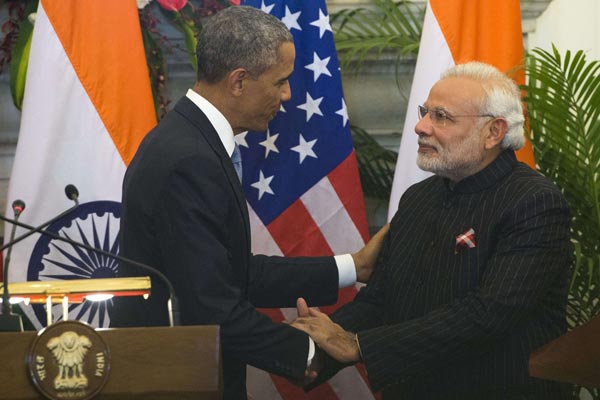
The two countries in 2008 signed a landmark deal giving India access to civilian nuclear technology, but it has been held up since by US concerns over India’s strict laws on liability in the event of a nuclear accident.
Speaking at a joint press conference after more than three hours of bilateral talks, the two leaders said they had managed to break the impasse in a move that officials said would involve setting up an multi-million dollar insurance pool and crucially would not require new legislation.
“I am pleased that six years after we signed our bilateral agreement, we are moving towards commercial cooperation, consistent with our laws (and) international legal obligations,” Modi said in New Delhi.
Mr Obama told reporters they had “achieved a breakthrough understanding” on issues that were “holding up our ability to advance our civil nuclear cooperation and we are committed to moving towards full implementation”.
“This is an important step that shows how we can work together to elevate our relationship,” the US president added.
Speaking to reporters after the announcement, the US Ambassador to New Delhi Richard Verma said the two sides had “come to an understanding of the liability” issue that would operate “through a memorandum of law”.
It would be up to individual nuclear power companies to conduct their own risk assessment, said Mr Verma, adding the agreement reached between the two leaders would not “require at this stage a legislative undertaking.”
“It opens the door for US and other companies to come forward and actually help India towards developing nuclear power and support its non carbon-based energy production,” said the ambassador.
LIABILITY
The issue of liability is hugely contentious in India with campaigners still furious at the levels of compensation paid out by the US company Union Carbide over the 1984 chemical leak at a factory in Bhopal which is estimated to have killed more than 20,000 people in the long run.
However, the stalling of the civil nuclear agreement, in part thanks to opposition in parliament from Modi’s own Bharatiya Janata Party (BJP) before it won power in elections last year, has been a major thorn in the side of efforts to improve bilateral ties.
Mr Modi said the original agreement had “created new economic opportunities and expanded our option for clean energy” and that both sides had been determined to ensure it did not become permanently snagged.
Indian foreign secretary Sujatha Singh said the differences had been ironed out in three rounds of talks between the two sides in the build-up to Sunday’s summit, during which New Delhi fleshed out plans to set up an insurance pool. “Let me underline that we have reached an understanding. The deal is done,” she said.
Amandeep Singh, a senior foreign ministry official, said the precise details were still being worked out, but India’s state-run reinsurer GIC Re and four other private companies would operate the insurance pool.
“These companies will together contribute 750 crore rupees (around $120 million) to the pool and the balance capacity will be contributed by the government,” he said.
“This is the general shape of the pool and is similar to 26 such international pools around the world,” he added.


